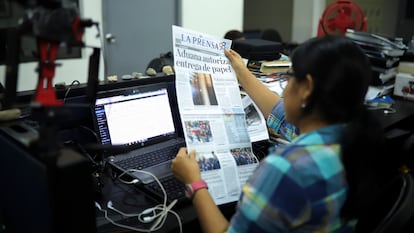Journalists on the verge of extinction in Nicaragua
Ten of the country’s 15 regions lack any type of journalists, who have been expelled, persecuted, or detained by the Ortega and Murillo regime


In 10 of the 15 regions that make up Nicaragua, journalists, TV anchors, radio hosts and even local reporters — who detail the goings on in their communities on Facebook pages — have disappeared.
Across the country, the journalistic profession has been extinguished, due to persecution by the regime of President Daniel Ortega and Vice President Rosario Murillo. This is according to a report published on Monday, January 13, by the Foundation for Freedom of Expression and Democracy (FLED), which has issued warnings following the events of 2024. The report is an x-ray of freedom of expression and the press in the Central American country, whose people are subjected to “a totalitarian model,” in which dissenting voices have been criminalized.
The report highlights that not only journalists, as such, have been criminalized: so have local bloggers, who report on events that may seem trivial for the Ortega administration — such as traffic accidents, or patron saint festivals — but which also make the regime uncomfortable. FLED affirms that, in 10 regions of the Central American country, journalistic practice no longer exists in any form. “There’s an expansion of news deserts,” the authors emphasize, alluding to the lack of available information.
“In these areas, independent journalism isn’t practiced due to government harassment. This year, five new [regions] — Granada, Madriz, Nueva Segovia, León, and Río San Juan — joined [this group], raising the total number of regions without independent journalistic coverage in Nicaragua to 10. Currently, [state-controlled] media controls 59% of the information space in the country. If the repressive measures continue, this figure could increase significantly,” the report published by FLED predicts.
In the other five regions of Nicaragua, where there are still a few journalists and bloggers operating in increasingly narrow spaces, the report denounces that “professionals face constant harassment, threats and regular summons to police stations.”
“Many journalists work clandestinely, describing their work as ‘catacomb journalism.’ [They hide] to avoid being identified, while continuing to document the multiple human rights violations experienced by Nicaraguans,” the organization-in-exile points out.
Since the social protests of 2018, the repressive Ortega and Murillo regime has kept journalism in its crosshairs. Not only has the government imprisoned, tortured, and exiled dozens of reporters and media directors, while stripping many of their nationality: it has also targeted their relatives who remain in Nicaragua, in retaliation for any coverage that denounces the human rights violations being committed.
In 2024, FLED documented 81 cases of press freedom violations. “This is a slightly lower figure than in 2023, but the decrease doesn’t imply an improvement in conditions for the press, but rather an increase in self-censorship among victims. This means that many journalists and media [outlets] have chosen not to report the attacks [on human rights], in order to minimize the personal and professional risks involved in doing so,” the report reads. The authors note that they didn’t publish several complaints received, in order to guarantee the anonymity of the victims.
According to FLED, self-censorship has increased both internally and outside Nicaragua (that is, in exile). Many journalists frequently resort to caution in their publications, so as to avoid reprisals against their families, or to avoid being victims of judicial proceedings in absentia, something that’s allowed under the recently-reformed Penal Code. Several also moderate their rhetoric to avoid being classified as “traitors to the homeland,” a political sentence that implies confiscation and loss of Nicaraguan nationality.
Missing and exiled journalists
Of the 81 cases documented by the press freedom NGO, there are 57 affected individuals and 24 affected legal entities. Among the most frequent patterns of aggression are: stigmatizing discourse, which is utilized by state officials and pro-government media to discredit journalists and independent media; physical and verbal aggression, as well as abuse of state power. In 49% of cases, the state has been the main aggressor, followed by parastatal elements, at 37%.
In greater detail, FLED points out that, “in 2024, officers from the National Police — using excessive violence — raided several journalists’ homes. In these raids, they confiscated their electronic equipment [...] In the last months of 2024, the government intensified its repression through forced disappearances, banishments, and arbitrary arrests, directed against independent media and journalists.”
The most notable case is that of Fabiola Tercero, who has been detained since July of 2024. She’s been disappeared: the authorities have said absolutely nothing about her whereabouts or her state of health. The FLED report also documents the arrest of Elsbeth D’Anda, director of a TV program on Channel 23, who was detained on October 27, 2024, after reporting on the increase in the prices of basic goods.
The arrest of Leo Catalino Cárcamo Herrera is also noted: he was violently captured by the National Police of León. “He’s a well-known journalist in his community. He was already arrested back in January of 2019, when he was still working at a local radio station. However, his most recent arrest has raised concerns due to his fragile health.”
In addition to the politically motivated arrest of journalists, the FLED report highlights another repressive pattern: the regime has attacked retired journalists, whom it has forced into exile. The most recent example is that of Henry Briceño, who, alongside his family, was violently detained and expelled from the country near the Peñas Blancas border crossing with Costa Rica. “His properties were confiscated by the government and his home now houses a Cruz Blanca headquarters, in a pattern that shows the state appropriation of private property,” the report states. La Cruz Blanca — the White Cross — is a version of the Red Cross Society, created by President Ortega as a Nicaraguan alternative after the organization was expelled from the country.
In its count of exiled journalists, FLED warns that 46 journalists were forced into exile in 2024 to protect their lives and those of their families. “Between 2018 and the end of [2024], the total number of exiled journalists amounts to 283 professionals. Likewise, FLED documented the banishment of five journalists: two in a violent manner and three who were denied re-entry into the country after work trips,” the organization reports.
According to FLED, another factor that deeply impacted Nicaraguan journalism in 2024 was that a considerable number of professionals abandoned the practice to dedicate themselves to other economic activities, with the aim of guaranteeing the livelihood of their families. At least 52 journalists left the profession.
“This phenomenon is due to multiple reasons, including growing unemployment in the [media] sector, the precariousness of salaries, the high level of danger associated with the profession, the closure of media and information spaces, as well as the rise of [self-employment in the private sector] as an alternative means of subsistence,” the report concludes.
Sign up for our weekly newsletter to get more English-language news coverage from EL PAÍS USA Edition
Tu suscripción se está usando en otro dispositivo
¿Quieres añadir otro usuario a tu suscripción?
Si continúas leyendo en este dispositivo, no se podrá leer en el otro.
FlechaTu suscripción se está usando en otro dispositivo y solo puedes acceder a EL PAÍS desde un dispositivo a la vez.
Si quieres compartir tu cuenta, cambia tu suscripción a la modalidad Premium, así podrás añadir otro usuario. Cada uno accederá con su propia cuenta de email, lo que os permitirá personalizar vuestra experiencia en EL PAÍS.
¿Tienes una suscripción de empresa? Accede aquí para contratar más cuentas.
En el caso de no saber quién está usando tu cuenta, te recomendamos cambiar tu contraseña aquí.
Si decides continuar compartiendo tu cuenta, este mensaje se mostrará en tu dispositivo y en el de la otra persona que está usando tu cuenta de forma indefinida, afectando a tu experiencia de lectura. Puedes consultar aquí los términos y condiciones de la suscripción digital.








































